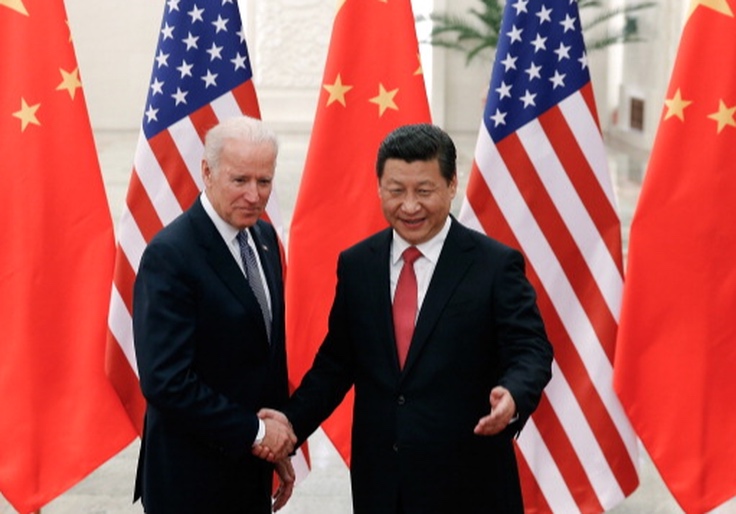A Biden administration proposal to effectively ban a chemical used to produce U.S. military equipment would make America's national defense apparatuses reliant on China and other foreign sources, domestic manufacturers are warning.
President Joe Biden's Environmental Protection Agency last year unveiled rule proposals aimed at banning certain chemicals under the Toxic Substances Control Act. At least one chemical on the chopping block—methylene chloride—is used to produce military equipment such as bulletproof glass, helmets, and fighter jet canopies. As a result, companies that rely on the chemical to produce such products are sounding the alarm, with polymer manufacturer Covestro arguing in a June letter to the EPA that the ban would "require military and police related applications to be manufactured from foreign sourced materials."
The proposed ban comes as China works to ramp up its chemical production. While the communist nation controlled just 9 percent of the world's chemical sales in 2003, it is now the largest chemical producer in the world, accounting for 44 percent of global sales as of 2022. That year, China was one of the world's top exporters of carbon tetrachloride, which is used to destroy chemical weapons. China is also the world's top exporter of methylene chloride, which the Department of Defense also uses to make specialty batteries and remove paint from aircraft, among other manufacturing purposes.
The department under Biden has worked to build up the domestic production of "high priority chemicals" in an attempt to reduce "foreign dependency for critical materials required for DoD missiles and munitions." To remain in line with that mission, the EPA generally issues national-security-related exemptions on its environmental regulations.
At least one company, however, is arguing that even with those exemptions, the Biden administration's methylene chloride ban would impact the supply chain for military equipment.
Chemical manufacturer Nalas Engineering Services inked a $2 million deal with the Department of Defense in 2022 to "strengthen the domestic critical chemicals industrial base" and, as it wrote in a July letter to the EPA, is subsequently allowed to use banned chemicals "that are critical to the support of national security." The company nonetheless argued in the July letter that a methylene chloride (DCM) ban would throw a wrench into its supply chain.
"Nalas manufactures chemicals that are critical to the support of national security. As such, Nalas' processing of DCM is a specifically allowable condition of use per the proposed rule," the company wrote. "However, Nalas is concerned that the additional proposal constraints—which prohibit uses that account for roughly a third of current DCM production—will have long term supply chain implications."
Another chemical manufacturer, Boulder Scientific Company, echoed those concerns, writing in its July response to the EPA that a methylene chloride ban could force large chemical producers "to seek suppliers of chemicals from non-domestic sources."
The EPA defended its proposal, arguing that it would not impact defense contractors and would leave a "sufficient supply" of chemicals such as methylene chloride on the market.
"The proposals involve a mixture of approaches, including proposed prohibition for certain uses that EPA determined cannot continue safely, as well as for other uses strict workplace controls that allow the uses to continue," an agency spokesman told the Washington Free Beacon.
This is not the first time the EPA's proposed ban has attracted national-security-related concerns. In September, a Department of Energy laboratory blasted the agency's proposed methylene chloride ban, arguing that the move would hinder the lab's ability to detect weapons of mass destruction and conduct "complex" national defense research.
"[The laboratory] is concerned that the availability of methylene chloride from vendors and distributors for these important DOE mission research purposes will be limited or non-existent," the lab wrote in a letter.
Update Jan. 24, 10:10 a.m.: This piece has been updated to reflect a comment from the EPA.
